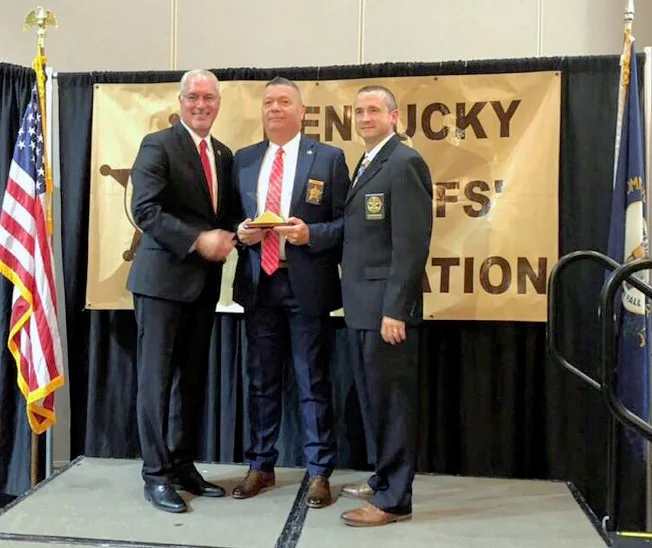Association Seeks to Unite Crisis Negotiators Statewide
Whether it is a barricaded person or someone who is threatening to end their own life, many law enforcement agencies across Kentucky have teams of dedicated officers with the skillset to defuse the situation.
Crisis negotiation, like any other discipline, requires training, Frankfort Police Capt. Lynn Aubrey said. Aubrey serves as commander of Frankfort’s Crisis Negotiation Unit (CNU) and is president of the newly formed Kentucky Association of Crisis Negotiators.
Negotiation teams play a crucial role across the state, Aubrey said, and KACN is dedicated to supporting increased training in this specialized area of law enforcement.
Using Frankfort’s CNU as an example, Aubrey said crisis negotiation is not just hostage negotiation.
“We’re not always called out on hostage situations,” she said. “In fact, the majority of the time we’re called out, there is not a hostage involved. We’re called out when an individual is in crisis and typically barricaded inside a location. We’ve done a number of suicidal subjects that are barricaded inside (a structure), where we try to convince them to come out without harming themselves.”
Additionally, many crisis negotiation units are activated to assist an agency’s tactical unit, which is the case in Frankfort.
“The tactics for our high-risk search warrants have changed a lot for the (Frankfort) Tactical Response Unit (TRU) over the last decade,” Aubrey said. “Rather than break and enter, they don’t typically do that anymore because of safety issues. Now, with high-risk warrants, they’ll do a surround and call out. They do the surrounding part and we do the call out part.”
Adequate training is needed to effectively do the job, and that is where KACN comes in.
KACN has a simple goal.
“We’d like to be a clearinghouse for information for (law enforcement) negotiation teams,” Aubrey said. “(Several) negotiators have been talking about doing this for a number of years. It was difficult to get all the agencies in the state together on (organizing an association). You have KOTA, which is the (Kentucky) Tactical Officers Association, but it’s easy to find agencies that have SWAT teams. It’s more difficult to find agencies who have negotiation units or teams because some of them are attached to the SWAT team, and they’re not an individual entity.”
History
For many years, the idea of forming an association was talked about, but nothing ever came of it. However, the Kentucky League of Cities got behind the effort in early 2017.
“They were instrumental in getting the ball rolling,” Aubrey said. “Troy Pitcock contacted me in May 2017 and wanted to know if I wanted to come to the initial meetings (in Elizabethtown) to help get things started. He sent out emails to people he knew wanted to be involved in the process, so we started having those initial meetings.”
In October 2017, KACN members established a board and adopted bylaws, Aubrey said.
Soon thereafter, KACN held its first conference in Louisville, in conjunction with KTOA’s, Aubrey said.
“It was a three-day conference and 20 people attended,” she said. “It wasn’t too bad for our first one.”
Getting the Word Out
Presently, KACN has 28 agencies represented in its membership, but Aubrey said there are several other agencies who are not aware of the association and the networking and training opportunities it affords.
“There are very few training opportunities for negotiators in the state,” she said. “We’re having to bring in groups from out of state or the FBI. I went to the FBI training. Last year, KACN hosted a training in E’town with a group out of Missouri. We have to bring a group from Missouri to do Level I training to get an officer trained so they can be certified to be a negotiator. The availability of training isn’t here in Kentucky. We’re hoping KACN can help foster that training and bring in more groups, even if they’re from out of state.”
There are three levels of certifications in negotiator training, Aubrey said. Level I is a basic negotiator certification; Level II is advanced certification and Level III is for commanders.
Each certification level requires 40 hours of training.
KACN’s immediate goal is to identify the different negotiation teams across the state, Aubrey said.
“Even if an agency doesn’t want to join KACN, they can still get on our email list and we can send them information on available training, or if there is a particularly successful negotiation, we will send that information out as a case study,” Aubrey said. “It would be great if they would join and become members just contact me with your team’s information and we’ll get that on the list.”
The cost of KACN membership is $25 a person for one year or a team membership (for those agencies with 10 or more negotiators) is $225 a year.
“We tried to make it cost-effective for everyone,” she said. “For example, Lexington has a ton of negotiators, so it wouldn’t be cost-effective for them to pay $25 per officer.”
Anyone interested in KACN can contact Aubrey at laubrey@frankfort.ky.gov.





